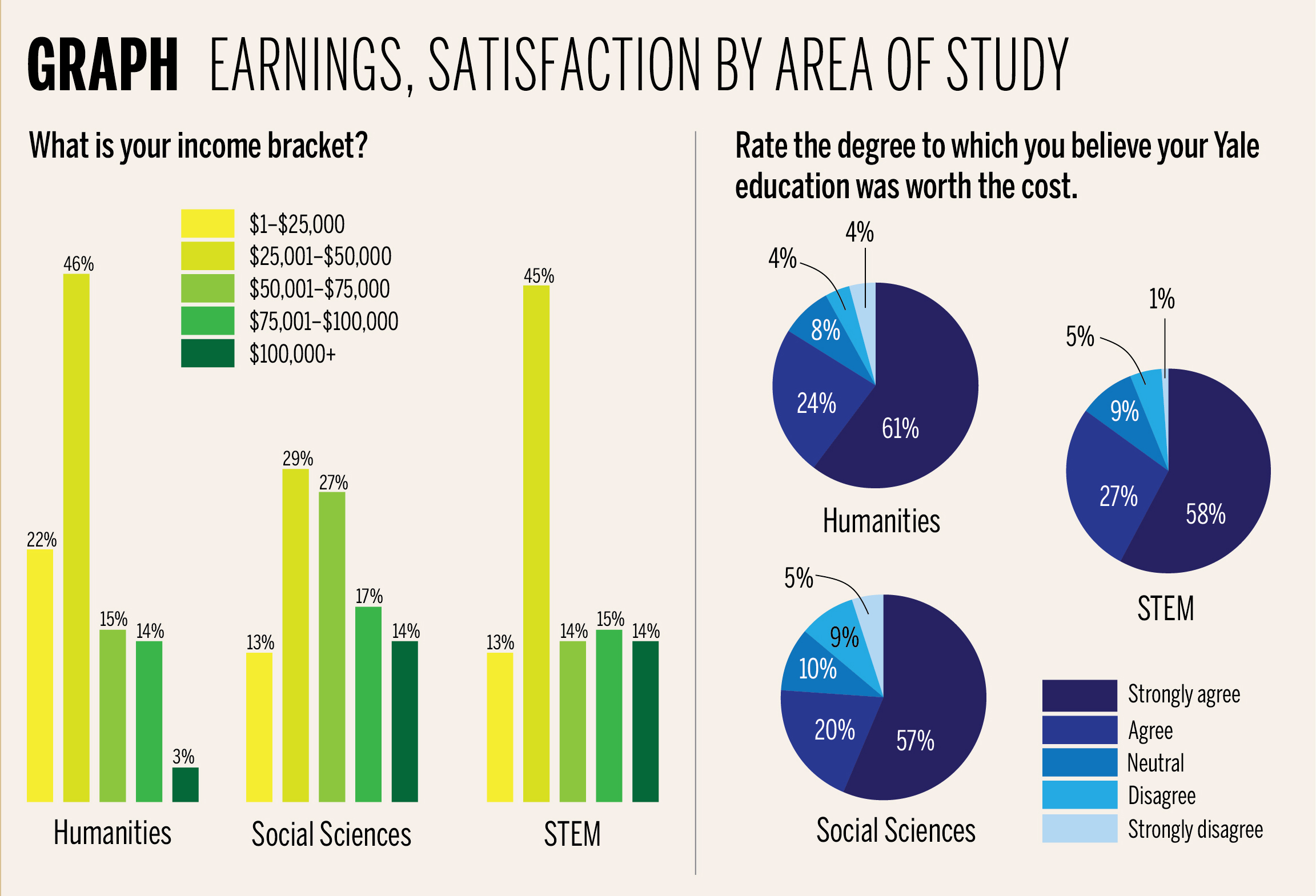
Students’ areas of study — ranging from the humanities to the social sciences to STEM — are related to their future earnings and satisfaction with Yale.
In a survey distributed by the News, 367 members of the classes of 2013 and 2014 rated the degree to which they believe their Yale degrees were worth the cost. The set of questions — issued in response to a national Gallup-Purdue Index on the same subject — asked respondents to include additional background information, such as current incomes and former areas of study. An analysis of the results reveals that the general subject area students choose to focus on significantly impacts future earnings and slightly impacts overall satisfaction with the worth of their Yale degrees.
The earnings of Yale graduates who majored in subjects within the humanities are significantly lower than those who focused on the social sciences and STEM, according to the survey data. While 14 percent of social science and STEM graduates reported earnings of more than $100,000, only 3 percent of humanities students said the same. Additionally, 68 percent of humanities-focused respondents reported a current income at or below $50,000, as compared to 58 percent of STEM-focused respondents and 42 percent of social science-focused respondents.
Professors and 18 survey respondents further interviewed by the News indicated that these gaps in average earnings could be attributed to different professional pursuits.
James Berger, a senior lecturer in American Studies and English who is currently teaching a course called “Poetry and Debates on the Value of Arts and Humanities,” said he hypothesizes that humanities-focused students are earning relatively less than those in the social sciences and STEM because they are not as attracted to certain high-paying jobs.
“To succeed in a profession that pays large salaries requires, I think, that you believe deeply that earning a large salary is your most important goal, or at least one of them,” Berger said. “People who are committed to the humanities don’t have those beliefs in the absolute value of money. Humanities majors don’t want to starve; they don’t, for the most part, aspire to be saints; they want to make a decent living.”
David Bromwich, professor of English, said the skills fostered by the humanities do not coincide with those of business, which helps to explain why humanities graduates are earning less than alums in other disciplines. He added that these students nonetheless valued their education because they were pushed to learn, think and imagine.
While those who studied the social sciences are earning the most on average, according to survey data, their responses also indicate that they are slightly less satisfied than those in the humanities and STEM: 85 percent of humanities and STEM-focused students either “strongly agreed” or “agreed” that their Yale education was worth the cost, while 77 percent of social science-focused students said the same. 14 percent either “strongly disagreed” or “disagreed” with the prompt, as compared to 8 percent of humanities students and 6 percent of STEM students.
Professors and graduates interviewed said humanities students feel relatively more satisfied because of the intangible skills they learned at Yale, while social science-focused students are more likely to prioritize professional goals over their passions, leading to decreased satisfaction but higher incomes. For STEM students, graduates said that the small size of Yale’s programs ultimately lead to additional professional opportunities.
Zack Graham ’13 — who switched from studying economics to English as an undergraduate — said humanities students have more satisfactory experiences because they are more passionate about their studies.
“The humanities majors I know believe their educations were more worthwhile and fulfilling because they learned what they wanted to learn about,” he said. “For those in Economics, it was more about going into professional sectors, so there was no real passion. They just wanted the degree for their resumes in order to get the job.”
While social science-focused students vary in focus and aspiration, Marlena Vasquez ‘13 said a higher degree of satisfaction amongst STEM graduates could be attributed to their more linear career paths.
Aayush Upadhyay ’14, a computer science major, said the small size of Yale’s department led him to pursue more professional opportunities while in college.
“So many companies came to recruit,” he said. “I felt like we got more events because other companies are recruiting at schools with 1,000 computer science majors whereas we had just 200-300, but we got equal attention.”
Steven Morales ’13, who “strongly agreed” that his Yale degree was worth the cost, said he thought his major, Modern Middle East Studies, could have been improved. However, he said he does not believe majoring in another subject, whether it be in the humanities, STEM or social sciences, would have impacted his satisfaction with Yale, because he still would have been required to enroll in a variety of courses.







